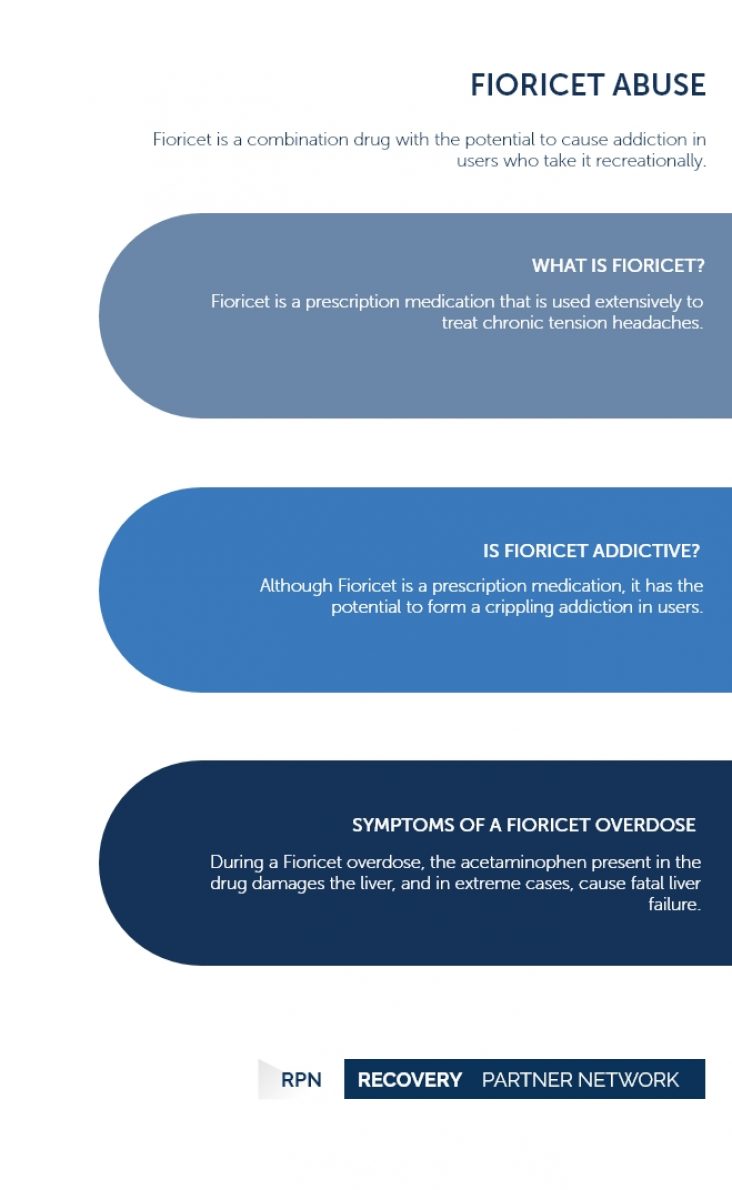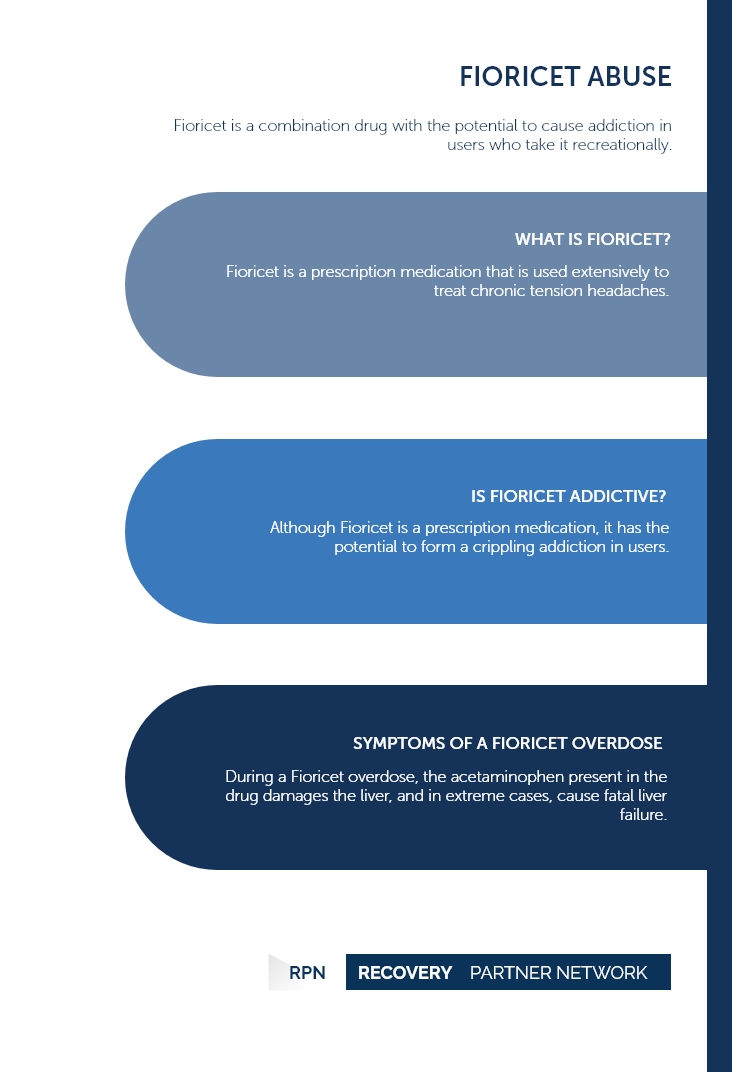Fioricet is a combination drug with the potential to cause addiction in users who take it recreationally.
Fioricet Abuse
Butalbital/acetaminophen addiction | Table of Contents
What is Fioricet?
Fioricet is a prescription medication that is used extensively to treat chronic tension headaches. Tension headaches are fairly common and cause moderate pain in the front, sides, and back of the head. However, when an individual experiences more than ten or fifteen tension headaches every month, a healthcare provider may prescribe Fioricet to manage them. Certain doctors may also prescribe Fioricet for migraines, a type of headache that causes severe pain on one side of the head as well as hypersensitivity to sound and light.
FAQ
Fioricet is a prescription medication used to treat migraines and tension headaches.
Products that contain butalbital/aspirin/caffeine are classified as schedule III substances.
The generic name of Fioricet is acetaminophen, butalbital, caffeine, and codeine.
What are the Ingredients in Fioricet?
Combination medications such as Fioricet are drugs that contain two or more pharmaceutical drugs in a fixed-dose. Fioricet contains three ingredients, namely acetaminophen, butalbital, and caffeine, each with unique properties that are combined to ease headaches.
Also known by the brand name Tylenol, acetaminophen is a drug that reduces fever and pain by disrupting the prostaglandin chemical production in the brain, which is responsible for activating pain signals in the nervous system.
This is a sedative barbiturate that triggers the brain’s production of GABA, a neurotransmitter that calms the nervous system by preventing signals between neurons. Classed as a Schedule III Controlled Substance in the US, butalbital also loosens muscle tension in the brain to alleviate headaches.
This is a CNS stimulant that raises blood pressure. Although high blood pressure is not necessarily healthy, low blood pressure further aggravates headaches by causing blood vessels to swell and push against the brain. Thus, by raising blood pressure, caffeine constricts blood vessels and increases blood flow to help alleviate headaches.
Fioricet can be an effective source of relief from headaches due to the presence of the above three ingredients. However, it also carries the risks of side effects, overdose, and addiction. Thus, doctors turn to Fioricet only as a last resort when safer over-the-counter medications do not prove effective.
Is Fioricet Addictive?
Although Fioricet is a prescription medication, it has the potential to form a crippling addiction in users. The risks of addiction are usually low when the medication is taken as prescribed. However, when a user consumes Fioricet as opposed to the prescription, he/she may develop a tolerance to its effects, causing the individual to consume increasingly high doses of the medication to alleviate headaches.
The prolonged use of Fioricet can lead to the formation of dependence. Individuals with dependence on Fioricet may find it difficult to function normally without the medication and face withdrawal symptoms when the medication is discontinued abruptly. The consumption of Fioricet to alleviate withdrawal symptoms is a clear indicator of an addiction. Individuals addicted to Fioricet may also experience intense cravings for the medication, compelling them to keep using the drug compulsively.
Furthermore, the ingredient butalbital present in Fioricet is also an addictive substance on its own. Since this ingredient is a central nervous system depressant that can generate a high, certain individuals use Fioricet as a recreational drug. At high doses, Fioricet can induce an intoxication that is akin to alcohol. As such, individuals who use Fioricet for recreational purposes generate a higher risk of developing an addiction than individuals who repeatedly use illegal drugs.
As per the Drug Enforcement Administration (DEA) data, Fioricet is the legal property of the pharmaceutical company Actavis, which is one of the three generic companies that have contributed significantly to the opioid epidemic.
FAQ
- Is Fioricet a narcotic?
- Why is Fioricet not a controlled substance?
- Are there different strengths of Fioricet?
- How much Fioricet is lethal?
Fioricet contains codeine, which is a narcotic.
The acetaminophen to butalbital ratio in Fioricet is around 97mg to 15 mg. This is more than the 70mg:15mg ratio, thus the drug is exempt from scheduling.
There are two forms of Fioricet and strengths for adults.
The amount of Fioricet, an individual, can overdose on depends on several factors such as age, gender, overall health, and genetics. The maximum dose stated per the pharmaceutical guidelines for Fioricet is six tablets, spaced four hours apart.
The Symptoms of Withdrawal
Fioricet withdrawal generally lasts between 8 hours to three days from the last drug use. Since withdrawal is the greatest obstacle to overcoming Fioricet dependence, medically assisted detox is mandatory to help patients safely undergo withdrawal without the fear of relapses. Patients are highly advised to seek professional and medical assistance as certain withdrawal symptoms can be dangerous or even life-threatening.
Fioricet withdrawal symptoms may include:
- Dizziness
- Insomnia
- Rapid emotional changes
- Seizures (in rare cases)
- Muscle spasms
- Nausea and vomiting
- Tremors
- Weakness
- Anxiety
- Rebound headaches
FAQ
It takes approximately two weeks to get all of the Fioricet out of the body.
Side-Effects of Fioricet
Similar to most medications, Fioricet can also bring in various side effects. Individuals who abuse Fioricet or use it compulsively are at a greater risk of facing the worst side-effects of the medication.
Some of the possible side-effects of Fioricet are:
- Drowsiness
- Dizziness
- Anxiety
- Intoxication
- Lightheadedness
- Nausea
- Vomiting
- Tremors
- Shortness of breath
- Trouble sleeping
- Stomach pain
In certain cases, Fioricet users may also develop an allergic reaction to the drug, with symptoms such as troubled breathing, itching, rashes, intense dizziness, and swelling in the throat, face, and tongue.
FAQ
- What are the side effects of Fioricet?
- Can you take Fioricet for pain?
- Will Fioricet help me sleep?
- Can you drink coffee while taking Fioricet?
Sedation, dizziness, lightheadedness, vomiting, shortness of breath, abdominal pain, and feeling of intoxication are some of the common side effects of Fioricet.
Fioricet is a combination of medications that are used to treat complex tension headaches when other medications have not been effective. The combination of drugs sold under the brand name Fioricet can help manage severe pain.
The Butalbital component in Fioricet helps to sedate and cause sleepiness and relaxation.
Caffeine tends to disrupt sleep. Therefore if you are taking Fioricet to calm you and help you sleep, it is best to avoid taking caffeine or caffeine-containing food and beverages several hours prior to bedtime.
Symptoms of a Fioricet Overdose
Individuals who abuse Fioricet for recreational purposes or to suppress withdrawal symptoms are the most likely to encounter Fioricet overdose. Although butalbital is the addictive component in Fioricet, acetaminophen is the ingredient that is responsible for a Fioricet overdose.
When an individual overdoses on Fioricet, the acetaminophen present in the drug damages the liver, and in extreme cases, overdoses can also result in fatal liver failure. Subsequently, it is particularly risky to take Fioricet with other medications that contain acetaminophen as the risks of overdose and death may increase. Consuming alcohol while on Fioricet may also impose damages to the liver.
Some of the symptoms of a Fioricet overdose are:
- Convulsions and seizures
- Fainting
- Nausea and vomiting
- Irregular heartbeat
- Restlessness
- Stomach pain
- Sweating
- Lack of appetite
- Tremors
- Confusion
- Jaundice
FAQ
For adults, the recommended amount is one or two tablets every four hours. If the tablet or capsule contains more than 325 milligrams or 500 milligrams of acetaminophen, six capsules a day is the recommended dosage.
Fioricet and Codeine
Certain formulations of Fioricet contain a potent opioid named codeine. Although codeine amplifies the pain-relieving properties of Fioricet, it also brings in its own risks of overdose and addiction. When an individual abuses Fioricet with codeine either accidentally or intentionally, they may face lethal respiratory depression.
Some of the symptoms of an overdose on Fioricet with codeine are:
- Extreme drowsiness
- Intense confusion
- Shallow breathing
- Slow heart rate
Thus, patients who receive Fioricet prescriptions should ensure that their prescription is codeine-free. If codeine is an ingredient in your prescription, consider asking your doctor to switch you to a codeine-free medication.
Recovery Partner Network
We aim to educate and empower. If you feel our library of resources does not cover your specific need, reach out to us, and we would be happy to help.
STATISTICS
© Copyright 2026


